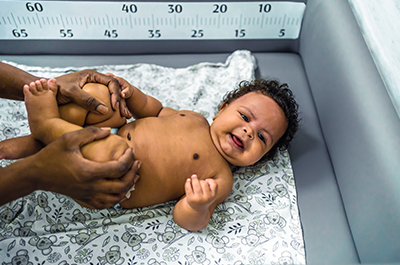Few things are more terrifying for parents than watching their child choke. Yet, it's a shockingly common experience, especially among children under age 3.
"It's normal for babies and young children to cough or choke on occasion," says Mollie Blanchard-Brown, M.D., a pediatrician at Henry Ford Health. "These reactions are the body's natural defense mechanism when foods, foreign objects and bacteria travel where they don't belong." Problems arise when a child coughs or chokes frequently or on specific objects.
Choking Basics
Choking happens when something is stuck in the airway, preventing a child from breathing normally. Kids choke for a variety of reasons: eating oversized bites, too much mucus in their system or coughing up an object that isn't meant to be ingested.
No matter what the cause, breathing in foods, objects and liquids can threaten a child's health. Materials entering the airway can damage the lungs, trigger infection and even cut off a child's air supply.
"Of course, choking is almost entirely preventable. The best way to manage it is to prevent choking from happening in the first place," Dr. Blanchard-Brown says. Here are her tips to prevent choking while also being prepared for an episode should one occur:
Babyproof Your Home
Young kids tend to put everything in their mouths. They're also less experienced at chewing and swallowing, so they may be more prone to choking fits. To add insult to injury, young children have smaller airways that are easily blocked by common objects. So get down on your hands and knees and survey the landscape. Toys and household items like loose change, coins, deflated balloons, small toy parts and batteries are all potential choking hazards.
Beware Of Problem Foods
While kids can shove too much of any food in their mouths, there are some kid-friendly staples that are more likely to induce choking episodes. Culprits include hot dogs, grapes, raw carrots, nuts, popcorn, hard candy, peanut butter, and chunks of meat or cheese.
Cut Food Into Small Chunks
Cut all of your child’s food into small bites or chunks. Whole grapes should be chopped into quarters, hot dogs should be sliced lengthwise and then into pieces (and remove the tough casing), and nuts should be chopped rather than served whole.
Learn Cardiopulmonary Resuscitation (CPR)
Despite the best-laid plans, choking episodes still happen. Every parent should consider taking an infant/child CPR class . You can take classes through your local American Red Cross, several hospitals and youth centers, or even using a kit from the American Heart Association.
Don't Stop A Coughing Child
Most of the time, foods or objects that get stuck in the trachea are easily coughed up and breathing returns to normal within minutes. If the child is coughing, it means they're breathing, so that's a good sign. Do nothing, monitor the child carefully, and make he or she completes the coughing spell and begins breathing easily.
Choking Savvy
While it's natural for kids to cough periodically, children who cough or choke regularly should check in with their pediatrician for a thorough evaluation.
If your child has an object blocking the airway, you may notice the following signs:
- Gasping or wheezing
- An inability to cry or make noise
- Turning pale or blue
- Appearing panicked
- Becoming limp or unconscious
If you've been trained in CPR, immediately start abdominal thrusts for infants/children and call 9-1-1.
After a serious choking episode, it's a good idea to have your child checked by a health professional. And you should always seek emergency care after any of the following:
- The child turned blue, became limp or was unconscious during the choking episode — even if he appears to have recovered completely.
- You think the child swallowed a sharp object, toy or battery.
- The child has a lingering cough, or is drooling, gagging or appears to have trouble breathing.
Concerned your child may be coughing excessively? There are a number of conditions that cause frequent choking, coughing and heavy breathing. Check with your health care professional for advice and guidance and make sure to get trained in infant and child CPR.
To find a doctor or pediatrician at Henry Ford, visit henryford.com or call 1-800-HENRYFORD (436-7936).
Dr. Mollie Blanchard-Brown is a pediatrician who sees patients at Henry Ford Medical Centers - Farmington Road and Bloomfield Township.



